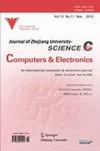使用DEVS的基于活动的仿真:通过并行DEVS仿真中的活动模型提高性能
Journal of Zhejiang University-Science C-Computers & Electronics
Pub Date : 2014-01-01
DOI:10.1631/jzus.C1300121
引用次数: 5
摘要
利用活动跟踪技术提高仿真性能是近年来建模领域的研究热点。参考活动已成功地用于预测和提高仿真性能。然而,跟踪活动只使用模型中包含的固有性能信息。为了在建模中扩展活动预测,我们提出了在元层次上使用活动元模型的活动增强建模。元模型提供了一组接口来对特定领域中的活动进行建模。为了解决由于活动模型异构而导致的仿真差异,设计了活动模型的序列变换。最后,实现了资源感知仿真框架,将活动模型集成到基于活动的仿真中。案例研究显示了使用离散事件系统规范(DEVS)进行基于活动的仿真所带来的改进。本文章由计算机程序翻译,如有差异,请以英文原文为准。
Activity-based simulation using DEVS: increasing performance by an activity model in parallel DEVS simulation
Improving simulation performance using activity tracking has attracted attention in the modeling field in recent years. The reference to activity has been successfully used to predict and promote the simulation performance. Tracking activity, however, uses only the inherent performance information contained in the models. To extend activity prediction in modeling, we propose the activity enhanced modeling with an activity meta-model at the meta-level. The meta-model provides a set of interfaces to model activity in a specific domain. The activity model transformation in subsequence is devised to deal with the simulation difference due to the heterogeneous activity model. Finally, the resource-aware simulation framework is implemented to integrate the activity models in activity-based simulation. The case study shows the improvement brought on by activity-based simulation using discrete event system specification (DEVS).
求助全文
通过发布文献求助,成功后即可免费获取论文全文。
去求助
来源期刊
自引率
0.00%
发文量
0
审稿时长
2.66667 months

 求助内容:
求助内容: 应助结果提醒方式:
应助结果提醒方式:


